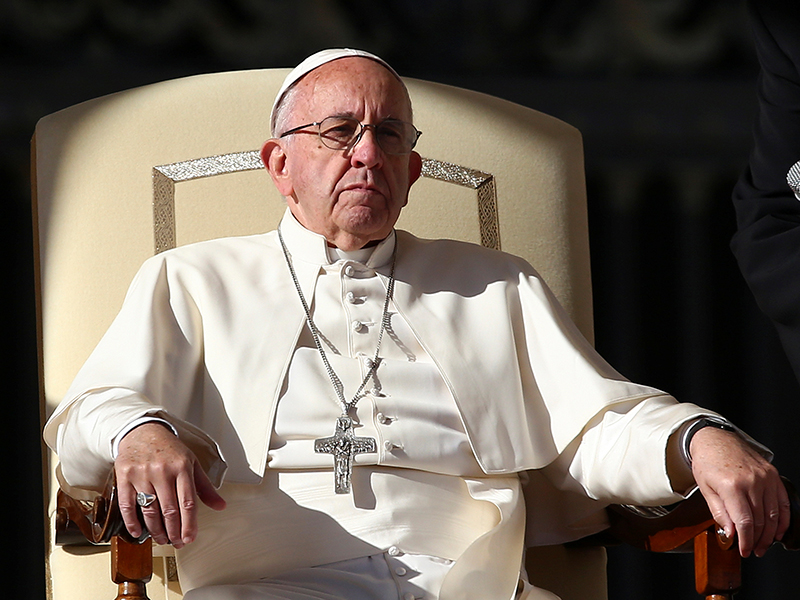Pope criticises ‘legalism’ after cardinals’ request for clarification
The Pope spoke out after a letter from four cardinals asked for clarification of Amoris Laetitia
Nov 19, 2016

VATICAN CITY: The debate over Amoris Laetitia has intensified, after Pope Francis suggested that some responses do not understand the document.
In an interview with the Italian newspaper Avvenire, partially translated by La Stampa, the Pope criticised “a certain legalism.” He said that responses to Amoris Laetitia exemplified this, and that some people thought issues were “black and white, even though it is in the course of life that we are called to discern”.
The Pope added: “The Council told us this, but historians say that a century needs to pass before a Council is properly assimilated into the body of the Church… we are half way.”
It comes after four senior cardinals asked the Pope to clarify Amoris Laetitia. In a letter to the Pope, Cardinals Raymond Burke, Carlo Caffarra, Walter Brandmüller and Joachim Meisner submitted five “dubia” – a traditional way of asking for clarification.
The cardinals asked the Pope whether certain Church teachings about Communion and the moral law, which Amoris Laetitia discusses ambiguously, are still valid.
These included the doctrine that the divorced and remarried cannot receive Communion unless living as brother and sister, and the doctrine that some acts are intrinsically wrong.
The submission of “dubia” invites a yes-or-no answer. In this case, it was a question of whether the Pope thought some teachings, especially Catholic doctrine on the moral law, should still be regarded as true.
The letter was sent in September, but the Pope has not replied. The cardinals said they took this as an invitation to publish the letter and let the debate continue in public.
In an interview with the Vatican journalist Edward Pentin, Cardinal Burke said that if the Pope remained silent, it might be necessary to issue a “formal act of correction of a serious error”.
Pentin told EWTN yesterday: “I do understand, from sources within [the Pope’s residence] Santa Marta, that the Pope is not happy at all, that he’s quite at his…boiling with rage.” Fr Antonio Spadaro, an associate of the Pope, has dismissed these reports.
This weekend, the Pope will officially appoint new cardinals at a meeting known as a consistory. However, he has cancelled the usual pre-consistory session where cardinals raise issues of concern. No reason has been given, but there is speculation that other cardinals might have wanted to ask about the dubia.
Cardinal-designate Joseph Tobin, who will be created a cardinal at the consistory, told the Tablet that he thought the four cardinals’ letter was “at best naive”.
Meanwhile, two American archbishops have clashed over implementation of Amoris Laetitia.
Archbishop Charles Chaput has issued guidelines for his own archdiocese of Philadelphia, in which he says that the divorced and remarried should be treated with mercy. He also restates the Church’s teaching that they may not receive Communion unless they endeavour to live as brother and sister.
In an interview with Catholic News Service, Cardinal-designate Kevin Farrell criticised the guidelines, saying: “I don’t share the view of what Archbishop Chaput did, no.” Cardinal-designate Farrell said: “It is better to say to the couple, ‘Let’s work together and let’s walk together’ – as Pope Francis would say – ‘through this process and see how far we arrive.’”
The Catholic Church cannot react by “closing the doors before we even listen to the circumstances and the people,” the cardinal-designate said. “That’s not the way to go.”
In response, Archbishop Chaput told Catholic News Service: “I wonder if Cardinal-designate Farrell actually read and understood the Philadelphia guidelines he seems to be questioning. The guidelines have a clear emphasis on mercy and compassion. This makes sense because individual circumstances are often complex. Life is messy. But mercy and compassion cannot be separated from truth and remain legitimate virtues.
“The Church cannot contradict or circumvent Scripture and her own magisterium without invalidating her mission. This should be obvious. The words of Jesus himself are very direct and radical on the matter of divorce.”--Catholic Herald







Total Comments:0